Swiss man secretly helped CIA in nuclear sting
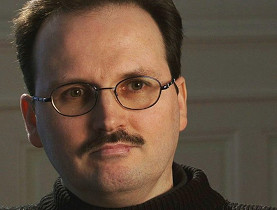
A Swiss man suspected of passing on nuclear secrets says he tipped off American spies with information that led to the fall of Libya's atomic weapons programme.
Speaking publicly for the first time since his release from prison, Urs Tinner said he told the Central Intelligence Agency in 2003 that Libya was about to receive equipment needed to make an atomic bomb.
Agents at a shipyard in Italy shortly afterward seized centrifuges bound for the African country. The bust eventually forced Libyan authorities to admit to having a clandestine nuclear programme, which they then ended.
Though the CIA has not commented on the case, a documentary about the affair aired on Swiss public television on Thursday evening and shed new light on exactly how Tinner claims he was involved.
The film coincided with the release of a federal report that accused the Swiss cabinet of mishandling the matter and destroying evidence in the Tinner case including detailed designs for a nuclear warhead.
Urs Tinner, his brother Marco and father, Friedrich were arrested starting in 2004 by Swiss authorities on suspicion of smuggling nuclear secrets. Friedrich Tinner was released in 2006, followed by Urs in December 2008. Neither was ever charged.
Marco Tinner, in custody since September 2005, was released on Friday after posting bail of SFr100,000 ($88,260).
Spies in Switzerland
According to the documentary called The Spy from the Rhine Valley, the Tinners were friends with Abdul Qadeer Khan, the founder of Pakistan’s nuclear programme and head of a black market network that supplied Iran and Libya with weapons parts.
Khan, who called the Tinners “an honest Swiss family”, stayed at their house.
The Tinners are engineers who deal in centrifuges. Authorities suspected them of contributing to Khan’s network, which Khan denied in the documentary. Khan’s system was disrupted in 2003 after the centrifuges bound for Libya were seized.
The report produced by a parliamentary supervisory committee states that on June 21, 2003, six CIA agents did in fact approach Marco Tinner with what they said was a search warrant.
It was unclear what, if anything, they found, but the agents could have had access to potentially sensitive data.
“At that time the agents got Marco Tinner to cooperate with the American authorities,” the report states.
Sabotaged
In the documentary, Urs Tinner says he sabotaged equipment that he knew was bound for secret uranium enrichment programmes so it would malfunction on the first use. He doesn’t say which country had ordered the parts.
Urs Tinner was arrested in 2004 in Germany before being brought back to Switzerland in 2005. The nuclear smuggling case never went to trial and the media have long speculated that the Tinners were spying for the CIA – a punishable offence in Switzerland – and that Washington put pressure on Bern to destroy evidence in the case.
Former Justice Minister Christoph Blocher told the documentary filmmakers that he travelled to Washington in 2007, three years after the Tinners’ arrest, to discuss the matter with the Americans.
Blocher said the Americans wanted thousands of case files but he refused to hand them over. The Swiss cabinet later decided to destroy them after members learned they held plans for nuclear warheads.
A blast of criticism
A parliamentary delegation on Thursday strongly criticized the cabinet’s decision to do that, saying it overreacted as there was no immediate threat to Switzerland’s security. All possibility of determining guilt or innocence in the case vanished with the destroyed evidence.
The report was particularly critical of Blocher for not having informed the cabinet quickly enough about the scope of what the dossier contained.
Only the rightwing Swiss People’s Party, of which Blocher is a member, has defended the move to destroy the files.
“What’s essential is that Switzerland’s security and sovereignty, as well as international law in regard to nuclear non-proliferation, were respected,” it said.
Other parties were less forgiving.
The centre-left Social Democratic Party has welcomed the publication of the report which showed that the destruction of the documents was “neither proportionate nor reasonable”.
In a similar vein both the centre-right Christian Democrats and the Radical Party pointed similar shortcomings.
“It should not have been possible, in Switzerland, that these documents could be destroyed on the basis that they couldn’t be kept secret and secure,” the Christian Democratic Party said.
“We have to see to it that the separation of powers is strictly respected,” said the Radical Party, suggesting new measures might be needed to keep cabinet powers in check.
Cabinet members have not responded to the report, saying they wanted to read it in full first.
swissinfo with agencies
In 2004 the International Atomic Energy Agency supplied the Swiss authorities with a list of two companies and 15 individuals suspected of dealing in nuclear material with Iran and Libya.
Swiss engineer Urs Tinner, who is suspected of helping Libya obtain nuclear weapons technology, was arrested in Germany in October 2004. He was extradited to Switzerland in 2005.
His father Friedrich and brother Marco were also arrested by the Swiss authorities on suspicion of breaking the law on war materials by illegally exporting nuclear bomb-making equipment to Libya.
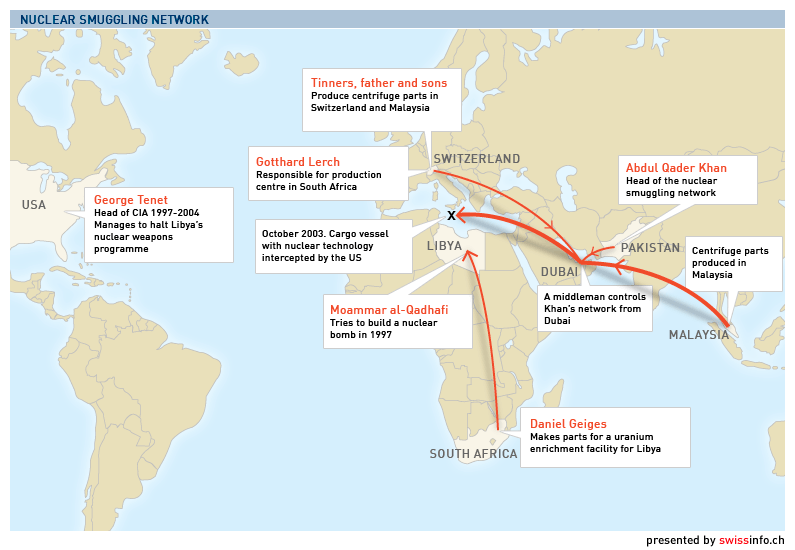

In compliance with the JTI standards
More: SWI swissinfo.ch certified by the Journalism Trust Initiative
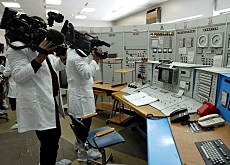
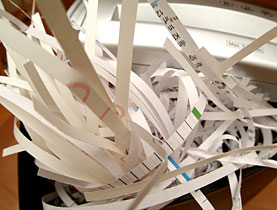
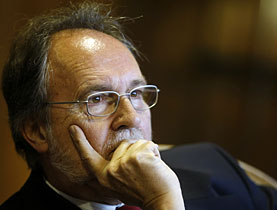
You can find an overview of ongoing debates with our journalists here. Please join us!
If you want to start a conversation about a topic raised in this article or want to report factual errors, email us at english@swissinfo.ch.